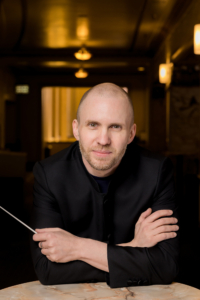BEETHOVEN SYMPHONY NO. 5
To defend Ludwig van Beethoven’s genius at this late date is not only unnecessary, but absurd. The work speaks for itself, as does its historical context and its enduring appeal. But certain biographical details can shed light on that work, and in contemplating the composer’s Symphony No. 5 in C minor it may be useful to know that Beethoven was essentially an autodidact. Having left school at the tender age of 11, he not only taught himself to write music at the highest level, he also honed his intellectual powers by reading widely. According to his friend and biographer Anton Schindler, in Beethoven’s library at the time of his death were copious quantities of music-related journals, scores, and theoretical tomes. There were also works of philosophy, theological tracts, groundbreaking reports on natural history, and complete editions of the great writers of his time and before.
Two particularly well thumbed volumes were the ancient Greek bard Homer’s Iliad and Odyssey. In the early part of the 20th century, the German musicologist Arnold Schering advanced a radical theory: The subject of Beethoven’s Symphony No. 3 in E-flat major, also known as the “Sinfonia Eroica”, he argued, was not its original dedicatee, Napoleon I, but the Homeric hero Hector, whose exploits form the Iliad’s core. With assiduous research—and the occasional imaginative leap—Schering demonstrated that Beethoven’s musical themes and structures were at odds with events in the French emperor’s life. However, they could be overlaid perfectly on the Iliad’s timeline, especially if one considered that Hector’s wife Andromache, left behind in Troy with the couple’s young son, inspired the Sinfonia Eroica’s more melancholic passages.
Beethoven “extracted certain scenes from the poem, transubstantiated them into music, and with them designed the first three movements of the symphony,” Schering argued. His view has its detractors today, but it is compelling enough that his view of Beethoven as “a spiritual child of German idealism” for whom “classical antiquity was a second homeland”, is worth considering when examining his oeuvre as a whole.
In the case of the Symphony No. 5, dubbed the “Fate Symphony”, Homeric concepts are especially applicable. In the blind poet’s Greece, death in battle led to posthumous fame, and while a long and quiet life had immediate rewards, its end would be the end; there would be no eternal glory for cautious souls. Need we ask which path Beethoven chose? His battle was aesthetic, not martial, but in both musical and historical terms, he achieved his goals, and it’s fitting that the best known passage in his entire output—the four-note motif that introduces the Symphony No. 5—is emblematic of Fate itself.
The African-American composer Carlos Simon has made it clear that he was thinking explicitly of Beethoven’s Homeric idealism when he composed Fate Now Conquers, which the Canadian conductor Yannick Nézet-Séguin premiered in 2020. More specifically, Simon was inspired by a journal entry from 1815, in which Beethoven quoted from the Iliad: “Fate now conquers; I am hers; and yet not she shall share In my renown; that life is left to every noble spirit/And that some great deed shall beget that all lives shall inherit.” This seems a clear indication that Beethoven was acutely conscious of posterity—and the fact that 21st-century composers are still reading his notebooks and quoting his music reinforces the clarity of his resolve.
Fate Now Conquers, a brief, enigmatic, and luminous fanfare, is loosely based on a particularly shimmering passage from the Beethoven canon. “Using the beautifully fluid harmonic structure of the 2nd movement of Beethoven’s 7th symphony,” Simon explains, “I have composed musical gestures that are representative of the unpredictable ways of fate. Jolting stabs [and] frenzied arpeggios in the strings that morph into an ambiguous cloud of free-flowing running passages depict the uncertainty of life that hovers over us.”
Fate and heroism take on markedly different roles in Sergei Prokofiev’s Piano Concerto No. 3 in C major. Here, the heroism is primarily pianistic; the composer, who premiered it himself with the Chicago Symphony in 1921, described the soloist’s part as “devilishly difficult”. That is impossible to deny, in part because of its passages of almost mechanical arpeggiation taken at an absolutely breakneck pace.
In this concerto, we also encounter Prokofiev’s personal notion of Fate, as shaped by both his experience of the Russian revolution and his interest in new forms of music as espoused by American jazz musicians and Italy’s Futurist ideologues. Whereas the ancient Greeks considered it possible to haggle with Fate, albeit using one’s own death as a bargaining chip, Prokofiev expresses it as an implacable force, as resistant to entreaty as some vast machine.
Perhaps all one can do in the face of such impossible odds is try one’s best—and that Prokofiev did, producing music of such enduring appeal that it may yet prove as immortal as Beethoven’s.
Notes by Alex Varty




 Natasha Paremski, piano
Natasha Paremski, piano